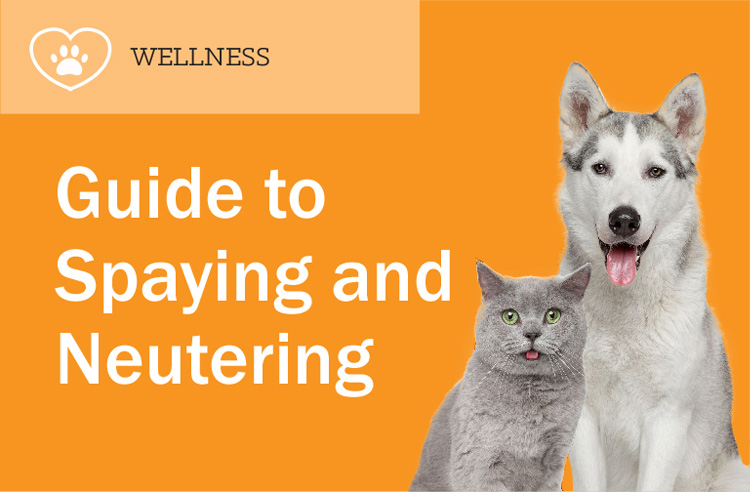
Spaying and Neutering Your Pet
As a pet owner, you make many important decisions that directly affect your pet's well-being. One of these decisions you have to make is whether to spay or neuter your pets. While many agree that these procedures are necessary, many do not know how they work, or how they benefit your pet. This article will offer some insight into how these procedures happen and how they will affect your pet in the long run.
What Does it Mean to Spay or Neuter Your Pet?
"Spay" and "neuter" are the terms used to describe different sterilization processes in animals. Spaying is also known as an ovariohysterectomy, which is the surgical removal of ovaries, uterus and fallopian tubes in a female animal. Neutering can also be called an orchiectomy, which is the surgical removal of the testes in a male animal. Spay and neuter surgeries are some of the most commonly performed surgeries on animals. Due to the high success rate of the surgery, many pet owners see astounding benefits in opting to have this procedure performed.

Why Do People Choose to Spay or Neuter Their Pets?
You might think that it is strange or unnatural to prevent your pet from reproducing, but this surgery is one of the most common preventive surgeries that vets perform. Here are just a few of the potential health benefits of spaying or neutering your pet:
- Early spaying can prevent uterine infections and breast cancer in female pets.
- Neutering can prevent testicular cancer and decrease your pet's risk for prostate gland enlargement (prostatic hyperplasia).
- Neutering can help diminish aggressive behaviors.
- Spaying eliminates negative behaviors associated with your pet's heat cycle such as nervous crying and anxious behavior.
Other Benefits of Spaying and Neutering
Spaying and neutering clearly offer many health benefits for your pets, but that's not the only reason why vets suggest this procedure for you pets. Here are some of the other benefits of spaying or neutering your pets:
- Spaying or neutering your pet directly helps prevent adding to the problem of pet overpopulation. Millions of dogs and cats are euthanized or remain homeless; by not allowing your pet to reproduce you are able to help prevent this problem.
- Strays can often interfere with wildlife conservation efforts.
- Neutering your pet can decrease their desire to mark their territory.

General Statistics About Spaying, Neutering and Pet Overpopulation
- Though it is impossible to determine exactly how many strays there are in the U.S., estimates for cats range up to 70 million. (ASPCA)
- 85% of dogs hit by cars are unaltered. (SPAYUSA)
- Feline Immunodeficiency Syndrome is spread by bites which commonly occur during fights. Intact cats are more prone to fighting aggressively with each other. (SPAYUSA)
- In six years, 67,000 puppies can be born from just one female dog and her offspring. Spaying or neutering your dog will reduce dog overpopulation. (Humane Society)
What Are the Risks?
As with any surgery, there are inherent risks in this procedure. Given that this is a commonly performed surgery, the risks of the surgery are slim if your pet is spayed or neutered at the proper age. The ASPCA suggests that puppies and kittens as young as eight weeks of age can be spayed or neutered. Some of the risks associated with the surgery are:
- Neutering can affect the muscle mass, metabolism and coat in male dogs.
- Removing your petís reproductive organs can be linked to an increased risk for some cancers. (AVMA)
- Older animals and those in heat have a higher risk for complications, which is why it is recommended to perform the surgery at a younger age.
- Postoperative complications can arise from improper care of the incision site but many of these are easily remedied with veterinary attention.
Myths Surrounding Spaying and Neutering
Many people believe that their pets will gain weight and become lazy if they undergo this procedure. This is completely untrue: the likely culprits behind weight gain and laziness in animals are poor diet and lack of exercise. Another myth commonly perpetuated is that it is normal to allow your pet to have one litter first. Evidence suggests that spaying or neutering your pet early offers more health benefits than allowing your pet to produce a litter. Additionally, spaying or neutering your pet will not alter their personality. This procedure will help ease sexually motivated behaviors such as "caterwauling", and aggression in males but will not affect your pet's love and affection for you. Choosing to spay or neuter your pet is an important decision pet owners must make. Being a responsible pet owner begins with a solid understanding of this vet recommended procedure. Make sure that your vet recommends this for your pet, to ensure that your pet is receiving the most personalized care. Lastly, we hope that following this article you will be able to make the most informed decision about caring for your pet.
https://news.vin.com/default.aspx?pid=210&Id=5814197&useobjecttypeid=10&fromVINNEWSASPX=1

